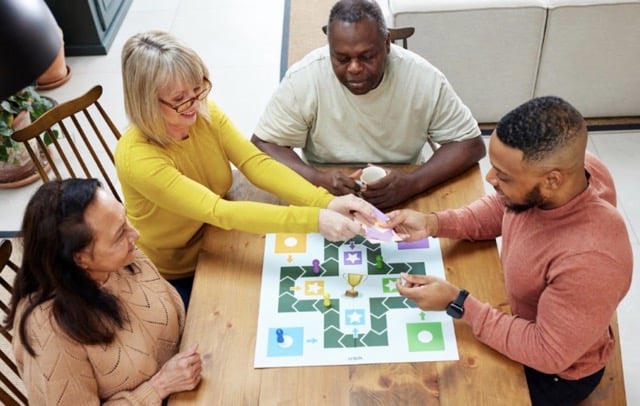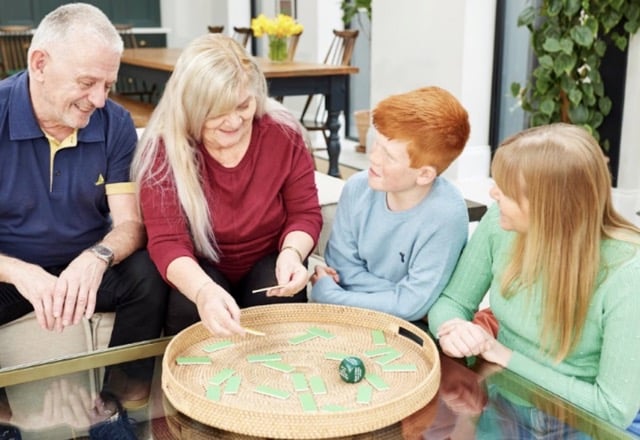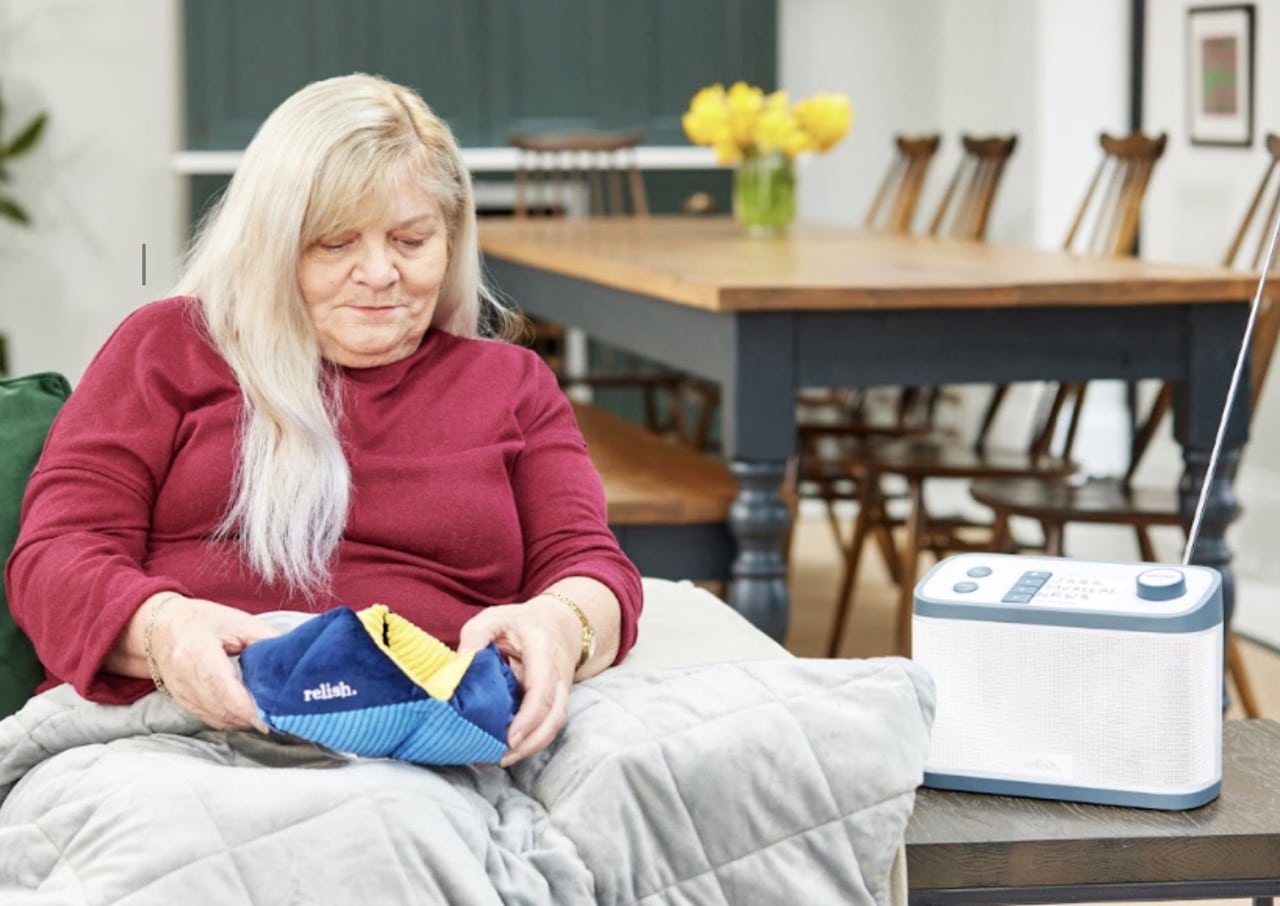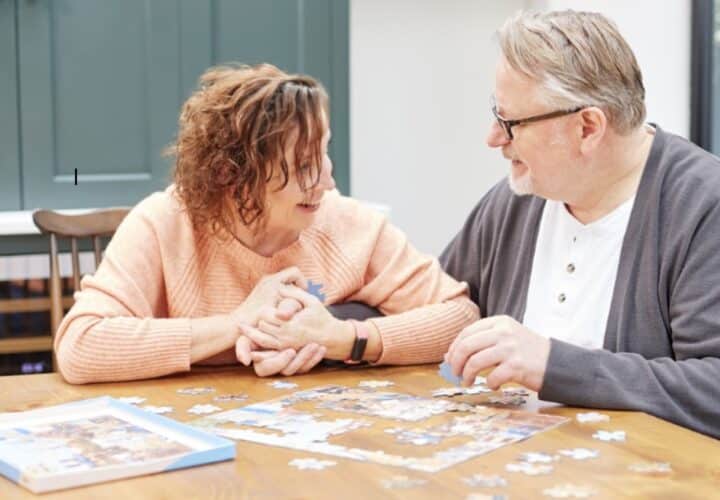What are some stimulating games for people with Alzheimer's or other dementias? Bianca Ansbro-Elliott at dementia-specific games company Relish explains how to choose an appropriate game for someone with dementia, along with some of her favorite game suggestions — and the science behind them.
Living with dementia can present unique challenges for older adults and their loved ones. Incorporating suitable games into their daily routines can have a profound positive impact on cognitive health and overall quality of life. As a member of the team at dementia games company Relish, I work with game designers who understand the range of unique challenges and needs of people living with dementia. Relish designs games to enhance wellbeing, promote independence, joy, calm and achievement for people with Alzheimer’s disease or other forms of dementia.
Why games matter in Alzheimer’s and dementia
Studies show that games can help improve cognition in people with dementia. While further research is needed to investigate these cognitive benefits further, playing games can also be a fun and engaging way to spend time, accomplish something and connect with others, fostering a better overall sense of wellbeing.
Dementia caregivers: What to consider when choosing a game
Getting the right game for a person living with dementia requires some consideration. You may find, as dementia progresses, that you need to adapt games to be a little simpler or choose easier games that suit their current abilities.
Here are some factors to consider:
- Your loved one’s interests and abilities: Consider the person’s lifelong hobbies, preferences, and abilities. Choosing games that align with their interests will increase engagement and enjoyment.
- Level of complexity: Opt for games with simple rules and clear instructions. This allows for easier understanding and reduces frustration. If you notice your loved one struggling to understand a game they previously could, try adapting it to simplify it.
- Sensory stimulation: Games that stimulate the senses through tactile, visual and auditory elements can be particularly engaging for individuals with dementia.
- Social Interaction: Encourage games that promote socialization, whether it be with family members, friends, or other individuals with dementia. This can foster a sense of connection and belonging, particularly when conversation is not as easy as it once was.
- Safety: Ensure the game environment is safe and free from potential hazards. Choose games that do not require complex motor skills or pose a risk of injury.

What are the best games for someone living with dementia?
Do word games help dementia patients? What about brain games? Puzzles? Coloring? Plenty of games are developed specifically with people with dementia in mind. They are adult-appropriate, yet help overcome some of the challenges associated with dementia to enjoy good fun still.
Here are a few different types of dementia games out there, including physical games and digital ones:
- Jigsaw puzzles: Puzzles have been shown to support cognitive function in people with dementia. They encourage a player to apply problem-solving and fine motor skills. Choose jigsaw puzzles with larger, easy-to-handle pieces and familiar themes, such as nature or nostalgic scenes that tie into your loved one’s interests.
- Memory matching games: When older adults play these reminiscence games, studies have shown the games stimulate memory recall and concentration. Use picture cards and photographs, or create personalized memory cards with familiar faces or places. It can be a great way to evoke positive memories from the past and relive moments of joy. Research has found that reviewing old photographs improves quality of life for those with dementia.
- Musical games: Music has a powerful effect on individuals with dementia. Encourage singing, dancing, or playing simple instruments to trigger memories and promote positive emotions. What’s more, music can be a great way to bond together as a family. There are tools (like personalized oldies playlists) and even products (like music players designed especially for people living with dementia) to help caregivers bring the power of music home.
- Digital games: Tablet or smartphone apps designed for dementia offer a wide range of interactive activities, including reminiscence games, puzzles, and brain teasers.
- Sensory games: Staying focused is inherently a greater challenge for people with Alzheimer’s disease and other forms of dementia due to the effects of these diseases on the brain’s hippocampus — the part of the temporal lobe that plays a role in learning and memory. But specially designed dementia games with a sensory element — be it visual, scent, tactile or auditory — can offer a lot of comfort, particularly for people in the later stages of dementia. In fact, researchers have found that just a small amount of movement, like fidgeting with hands, increases dopamine and norepinephrine — neurotransmitters that aid attention and focus. For example: Experts say scent-based activities may help people with dementia tap into good feelings — and good memories. Fidget blankets or fidget toys designed with dementia in mind.

The science-backed benefits of certain games in dementia
Games can be a great way to pass time with a loved one living with dementia, a way to connect, and a way to entertain. Beyond these perks, scientists are currently exploring whether they might have any lasting benefits to brain health for people living with dementia.
Games for cognitive function
In people living with dementia, a 2017 study found that games can stimulate cognitive function including memory, attention, language, and problem-solving skills, and a 2022 review found the same positive outcome.
Yet another 2020 study explored the benefits of games designed for people living with dementia and came up with some promising results. The researchers dove into the effects of board games, video games, and virtual reality games and their impact on dementia’s cognitive symptoms and found that when people with early-stage and middle-stage dementia used specific types of games designed for them, they saw boosts in cognitive function including
- short-term memory
- problem-solving ability
- communication ability
- reaction time
- logical reasoning
What types of games have these benefits? Completing puzzles has. been shown to help patients with dementia with cognitive function as well as using problem-solving and fine motor skills.
Of course, more investigation is needed to confirm these findings in older adults and in Alzheimer’s and dementia patients. These benefits aren’t proven in games, as study results are still mixed. For example, a 2021 review of research around brain games for people with cognitive impairments found that games didn’t necessarily make any difference in players’ cognitive function.)

Regardless, there’s no denying a couple benefits for all kinds of game players, including people living with dementia:
Well-chosen games have the potential to:
- support emotional wellbeing: In a review of studies into games and people living with dementia, scientists found that “serious games” (focused on learning and education) did provide a sense of achievement, boost mood, and alleviate depression and agitation.
- foster social connection and fight loneliness: Participating in group games is known to enhance social interaction, strengthen relationships, and combat feelings of isolation.
- improve quality of life: Engaging in dementia games adds a sense of purpose and joy to daily routines, improving overall quality of life, confidence, and wellbeing.
A powerful way to enhance care — and quality of life
When it comes to dementia care, games can be a powerful tool for promoting emotional wellbeing and enhancing the quality of life for individuals living with dementia. By considering the interests, abilities, and safety of the person with dementia, caregivers, relatives, and friends can select suitable games that engage and bring joy to their loved ones.
Remember, the journey is about supporting and connecting with individuals in a loving and understanding way. Games specially designed for people living with dementia are one way to create moments of happiness and fulfillment.





These Types of games that are suggested are soe that I use when I visit with my dementia clients and caregivers Excellent job